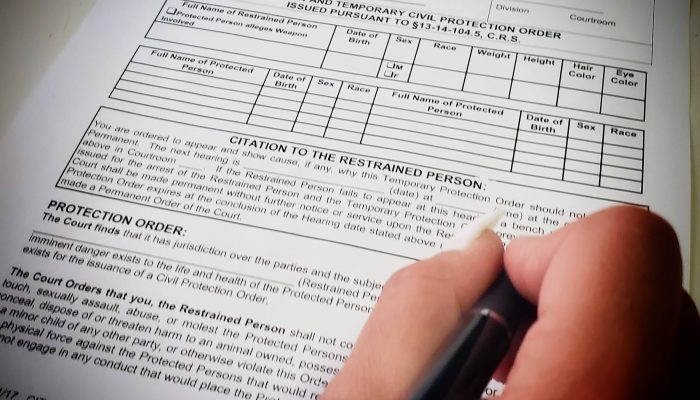How Do I Get a Restraining Order?

There are more than one way to obtain a restraining order in Colorado, in a criminal case or in civil court.
Criminal Mandatory Protection Order
When a defendant (offender) has been charged with a crime, the court will enter a Mandatory Protection Order (“MPO”) to help protect the alleged victim. A MPO says that the defendant cannot “harass, molest, intimidate, retaliate against, or tamper with any witness to or victim of the crime charged.” The prosecutor can ask the judge to include a no-contact order to protect the victim and potentially their family members if appropriate. A no-contact order says the offender cannot contact the victim, directly or indirectly.
The MPO is entered against the accused. This means that the accused has to follow the court’s order. The victim is sometimes called the “protected party.” The victim does not have to ask for a MPO. Even if a victim does not want a MPO, the court still enters one.
If a the defendant contacts a victim, this is called Violation of a Protection Order. If proven, a violation of a protection order is a crime. If a no-contact provision is included, even contacting the protected party via a third-party is a violation.
A MPO only lasts until the criminal case ends.
Federal and Colorado State Law say that if a Domestic Violence-related MPO has been entered against a person, they must give up their firearms and ammunition.
Civil Protection Order
A MPO in a criminal case is different from a civil protection order (“CPO”). A CPO is issued through the civil court. An individual has to ask for a CPO. The victim can ask for a CPO even when there is a MPO.
Steps to obtaining a Civil Protection Orde
File a Complaint with your local County Court. The necessary forms can be found online at www.courts.state.co.us.
✅ Attend a Temporary (ex parte) Protection Order Hearing (typically the same day you file the complaint). Because this is an “ex parte” hearing you can get the restraining order without the abuser being notified beforehand or even present in court.
✅ Personally serve the Respondent with the Temporary Protection Order. Service means you are notifying the Respondent that you have a court order that is in effect. Your local Sheriff, a local process server, or someone you know who is 18 years or older and who is not a party to the action, can serve the Respondent a copy of your Verified Complaint/Motion for Protection Order, the Temporary Protection Order, and an Affidavit of Service.
NOTE: A temporary protection order is designed to protect you until your hearing to make the temporary order a permanent order (typically within 14 days). The order is not enforceable until the abuser is personally served.
NOTE: You CANNOT personally serve the Respondent yourself. Remember to bring the original documents to Court on the day of your Permanent Protection Order Hearing, and always carry the returned Affidavit of Service and Temporary Protection Order with you in case you ever need to contact law enforcement.Attend the Permanent Protection Order Hearing on the date set by the Court or your temporary order will automatically expire. Again, bring all original documents with you to court.
✅ Call witnesses and present evidence at the PPO Hearing. The judge can issue subpoenas for witnesses you may need to testify. Bring any and all physical evidence, including; photos of injuries or damaged property, medical records, 911 calls, and videos. Do not worry if you don’t have physical evidence to bring to court. By far the most important evidence is what you tell the judge. Make a plan regarding what you want to say, write your plan including a list of the facts you want to tell the judge.
- You will need to show that the restrained person has committed the acts that led to the issuance of the temporary protection order AND
- That unless restrained, they will continue to commit the acts or acts designed to intimidate or retaliate against the protected person
The Permanent Order Hearing is conducted in front of a judge not a jury. Both parties can, and often do, call multiple witnesses. Both parties have the ability to cross-examine the witnesses called. Having a lawyer for the permanent Order Hearing is not required, but it is certainly advisable for both parties as the Colorado rules of evidence apply and should be understood by the parties.
If you are defending against a Colorado Civil Protection Order, you must seriously consider retaining a lawyer to represent you and handle all the above steps with you. If the restraining order is made permanent, you will lose many rights including your right to possess a firearm. You will also put yourself at risk for a criminal charge if you are deemed to have violated the protection order.
Contact us to seek a protection order or defend against one. https://www.m2lawyers.com/contact-us/
Disclaimer: The information in this blog post (“post”) is provided for general informational purposes only, and may not reflect the current law in your jurisdiction. No information contained in this post should be construed as legal advice from Muhaisen & Muhaisen, LLC. or the individual author, nor is it intended to be a substitute for legal counsel on any subject matter. No reader of this post should act or refrain from acting on the basis of any information included in, or accessible through, this Post without seeking the appropriate legal or other professional advice on the particular facts and circumstances at issue from a lawyer licensed in the recipient’s state, country or other appropriate licensing jurisdiction
